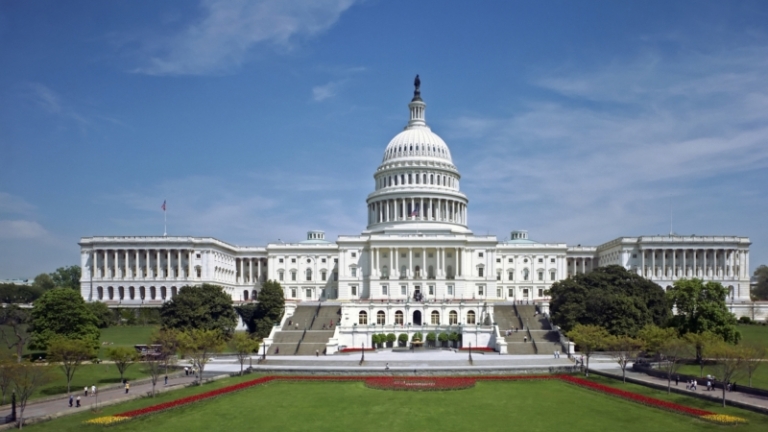
I. Legislative Branch
1) Legislation
Rep. Green Introduces Resolution Affirming Palestine’s Right to Exist. On September 26, Rep. Al Green (D-TX) introduced H.Res.769, a resolution affirming the State of Palestine’s right to exist.
House Bill to Codify Sanctions on PA and PLO Members. On September 26, Rep. Keith Self (R-TX) introduced H.R.5606, which would codify visa restrictions on Palestinian Authority (PA) and Palestine Liberation Organization (PLO) members.
2) Personnel and Correspondence
Lawmakers Meet with Syrian, Qatari, and Lebanese Officials. On September 22, Senate Foreign Relations Committee Ranking Member Sen. Jeanne Shaheen (D-NH) and House Foreign Affairs Committee Ranking Member Rep. Gregory Meeks (D-NY) met with Syrian President Ahmed al-Sharaa on the sidelines of the UN General Assembly (UNGA) to discuss US legislation to repeal the Caesar Act, strengthening Syria’s engagement with the international community, and the protection and inclusion of religious and ethnic minorities in Syria. Shaheen also met with Qatari Prime Minister Mohammed bin Abdulrahman Al Thani to discuss Qatar’s role as a mediator and with Lebanese President Joseph Aoun to discuss disarming Hezbollah.
Bipartisan House Members Call for Action on Colombia Over Criticism of Israel. On September 22, Reps. Jared Moskowitz (D-FL) and Maria Elvira Salazar (R-FL) led 16 of their colleagues in a letter to Secretary of State Marco Rubio calling for action against Colombian President Gustavo Petro over “his aggressive criticism of Israel” and “antisemitic rhetoric.”
House Democrats Warn Israel Against West Bank, Gaza Annexation. On September 25, Reps. Brad Schneider (D-IL) and Jamie Raskin (D-MD) led 178 other House Democrats in a letter to Israeli Prime Minister Benjamin Netanyahu, Minister of Foreign Affairs Gideon Saar, and Minister of Defense Israel Katz. The letter warned the Israeli leaders against the annexation of the West Bank or Gaza, stating that “such a move would not only violate international law but undermine decades of bipartisan US policy and threaten the progress of the Abraham Accords.”
Senate Democrats Urge Rubio to Protect Gaza Aid Flotilla. On September 25, Sens. Edward Markey (D-MA), Elizabeth Warren (D-MA), Chris Van Hollen (D-MD), and Jeff Merkley (D-OR) sent a letter to Secretary Rubio urging him to press the Netanyahu government to refrain from using force against the Global Sumud Flotilla, which is carrying humanitarian aid to Gaza and includes US citizens.
House Democrats Press Trump Administration to Recognize Palestinian Statehood. On September 26, Rep. Ro Khanna (D-CA) and 47 other House Democrats sent a letter to President Donald Trump and Secretary Rubio calling for the United States to recognize a Palestinian state, following the recognition of Palestinian statehood by several countries at the UNGA.
House Democrats Urge Trump Administration to Work with Arab League on Ending Gaza War.On September 26, Rep. Jake Auchincloss (D-MA) led 29 other House Democrats in a letter urging Secretary Rubio to work with the Arab League to “pressure Hamas to end its war with Israel.” The letter followed a July 29 Arab League declaration calling for Hamas’s disarmament and removal from power in Gaza, the release of hostages, and a path toward a two-state solution.
II. Executive Branch
1) White House
Trump Says Palestinian Statehood Would Reward Hamas. On September 23, in his address to the UNGA, President Trump said that recognizing a Palestinian state would reward Hamas and called for the return of all hostages held by the group and an immediate end to the war. On the same day, Secretary of State Rubio told reporters that “there is no Palestinian state no matter how many papers they put out, and the only time there’ll ever be one is if there is a negotiation with Israel.”
Trump Presents Gaza Peace Plan During Multilateral Meeting. On September 23, President Trump held a multilateral meeting on the sidelines of the UNGA with leaders from Egypt, Indonesia, Jordan, Pakistan, Qatar, Saudi Arabia, and the United Arab Emirates (UAE). Trump reportedly told the leaders that he would not allow Israel to annex the West Bank. Trump and Special Envoy Steve Witkoff presented a “21-point plan” to end the war in Gaza. According to media reports, the plan includes the release of all remaining hostages, a permanent ceasefire, gradual Israeli withdrawal from the entire Gaza Strip, a post-war governing mechanism that would exclude Hamas, a security force composed of Palestinians and soldiers from Arab and Muslim countries, funding from Arab and Muslim countries for Gaza’s reconstruction, and a potential future role by the Palestinian Authority.
On September 28, Trump reportedly said that he had received a “very good response” from Israel and Arab leaders to his plan and that he is optimistic about securing Netanyahu’s support when the two meet at the White House on September 29.
Trump Hosts Turkey’s Erdogan at White House. On September 25, Trump hosted Turkish President Recep Tayyip Erdogan in the Oval Office, marking the Turkish leader’s first White House visit since 2019. The meeting took place amid signs the United States may soon lift its hold on the sale of advanced F-35 fighter jets to Turkey, a top demand of Ankara.
2) Department of State
Rubio Speaks with Canadian Foreign Minister. On September 21, Secretary Rubio spoke with Canadian Foreign Minister Anita Anand about the situation in Gaza and “Hamas’s ongoing obstruction of peace.”
Rubio Meets with Syrian President. On September 22, Rubio met with Syrian President Ahmed al-Sharaa to discuss counterterrorism, efforts to locate missing Americans, and Israel-Syria relations.
Barrack Says Middle East Peace is an Illusion. On September 22, in a video interview with The National, Special Envoy to Syria and Ambassador to Turkey Thomas Barrack described peace in the region as “an illusion” and said that Israel was “attacking everybody,” including Syria, Lebanon, and Tunisia. He added that Israel is a valued ally and “has a special place in America’s heart.” Barrack also said that a Gaza ceasefire “is not going to work” and recognition of a Palestinian state is “useless” and “doesn’t help.” Regarding Lebanon, he stated that the United States arms Lebanon to “fight their own people, Hezbollah.” When asked about Israel’s strike on Qatar, Barrack said that it was “not good,” adding that Qatar had hosted Hamas and Taliban “at our request.”
Barrack Says Syria, Israel Near “De-Escalation” Agreement. On September 23, Special Envoy Barrack said that Syria and Israel are close to reaching a “de-escalation” agreement under which Israel would halt its strikes, and Syria would agree not to move machinery or heavy equipment near the Israeli border.
United States Chairs International Meeting on Libya. The Department of State announced that on September 23, the United States convened senior officials from Egypt, France, Germany, Italy, Qatar, Saudi Arabia, Turkey, the UAE, and the United Kingdom to discuss ways to promote unity, security, stability, and prosperity in Libya.
Rubio Meets with GCC Foreign Ministers. On September 24, Secretary Rubio met with Gulf Cooperation Council (GCC) foreign ministers to discuss GCC-US partnerships, Gaza, a Palestinian state, Syria, Lebanon, Iran, Israel’s attack on Qatar, and maritime security.
United States Welcomes Deal to Reopen Iraq-Turkey Pipeline. On September 25, Secretary Rubio issued a statement welcoming Iraq’s agreement with the Kurdistan Regional Government and international companies to reopen the Iraq-Turkey pipeline. Rubio stated that the agreement will strengthen US-Iraq economic ties, enhance regional energy security, and reinforce Iraq’s sovereignty.
United States Revokes Colombian President’s Visa Over Remarks at Pro-Palestine Protest. On September 26, the Department of State announced it would revoke Colombian President Gustavo Petro’s visa after he addressed a pro-Palestine protest on the sidelines of the UNGA meeting and called on US soldiers “to disobey orders and incite violence.”
UN Reimposes Sanctions on Iran; Rubio Says Diplomacy Still on the Table. On September 27, the United Nations reimposed sanctions on Iran over its nuclear program, completing the snapback process initiated by France, Germany, and the United Kingdom. Secretary Rubio said that President Trump continues to see diplomacy as an option, adding that for any deal to move forward, “Iran must accept direct talks.”
3) Department of War
AFRICOM Conducts Additional Strikes in Somalia. On September 21, US forces conducted an airstrike against the so-called Islamic State in Somalia.
United States and UAE Hold Military Dialogue. From September 25–26, senior US and UAE delegations convened in Abu Dhabi for the 9th Joint Military Dialogue. The talks covered newly announced partnerships between the US Defense Innovation Unit and the UAE’s Tawazun Council, as well as between the UAE and the Texas National Guard under the State Partnership Program. Both sides committed to deepening cooperation and to signing a Special Operations Forces Statement of Intent in the future.
CENTCOM Commander Urges Countries to Repatriate Citizens from Northeast Syria Camps. On September 26, CENTCOM Commander Adm. Brad Cooper called on countries to repatriate their citizens from Al-Hol and Al-Roj camps in northeast Syria and announced the creation of a Joint Repatriation Cell to coordinate the return of displaced and detained persons to their home countries.

